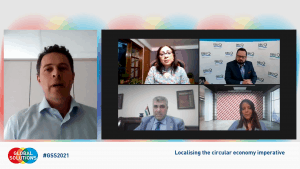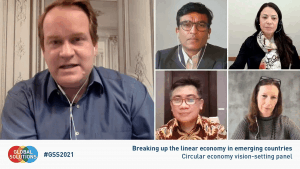

In the scope of a green technologies dissemination initiative implemented by Deutsche Gesellschaft für Internationale Zusammenarbeit (GIZ) in cooperation with the Global Solutions Initiative (GSI) on behalf of the German Federal Ministry for the Environment, Nature Conservation and Nuclear Safety (BMU), the global circular economy agenda is being advanced through a series of Circular Economy Solutions Dialogues (CESD).
The Circular Economy Solutions Dialogues (CESD) were launched with a view to inspiring a conducive circular economy (CE) narrative feeding into the G/T20 process. They build on the momentum of multilateral policy dialogues and commitments on the circular economy (GACERE, ACEA, LAC CE Coalition, G20 Resource Efficiency Dialogue), and focus on both analyzing mechanisms scaling-up circularity and devising context-sensitive strategies for their broad implementation.
The CESD span across three thematic cycles, focusing on 1) plastics, 2) supply chains, 3) urban metabolism and sustainable infrastructure. They are complemented by a Sounding Board, a parallel, amplifying dialogue stream dedicated to developing a cross-sector circular economy agenda at a multilateral level. The Sounding Board targets international fora, such as the G20, T20, ASEAN and the EU to connect the thematic dialogues with a multilateral perspective. It will be convened periodically to consolidate the insights of the CESD and related initiatives of GIZ and GSI.
Review of CESD #1: Bending the Linear Agenda: Circular Economy Policy Instruments, Business Models and Technology Uptake in the Plastics Value Chain
Thirty CE experts including public and private sector decision makers, and representatives from civil society, academia, think tanks and international organizations involved in CE initiatives worldwide participated in the first Solution Dialogue, convening four times in May and June 2021:
Notwithstanding the multitude of technological, business and other circular economy approaches for plastics proposed by the private sector, more conducive policy and financial framework conditions are required to turn individual initiatives into wide-scale global solutions. An appropriate mix of actionable policies capable of facilitating and accelerating a circular economy transition may include sustainable producer guidelines (e.g. Extended Producer Responsibility (EPR) systems), empowerment of consumers and public buyers, enhanced waste prevention initiatives, and incentives for the promotion of green technologies. These policy alternatives form the basis of discussion themes addressed by the first CESD, which focused on the circular economy in the plastics value chain and analysed enabling options and tools such as implementing EPR systems to establish regulated residual and resource streams.
Session one of the dialogue aimed at building a common understanding of challenges and solutions in integrating circularity in value chains, focusing on plastics, and at stimulating a forward looking, solution-focused discussion viewing the circular economy in two parallel lenses: 1) enabling frameworks 2) actual implementation.
The second session focused on the technological perspective of embedding circularity into the plastics value chain. Participants addressed the issue of mainstreaming circular economy technologies (incl. tech-based business models) in the plastics value chain, with discussions on key enablers of technology-based CE business models (incl. innovation, regulation/licencing, investment bankability), and on mechanisms facilitating large-scale uptake of the CE (notably standardisation and infrastructure).
The third session zoomed in on the challenge of scaling-up circularity in the plastics value chain. The participants discussed the promotion of an ecosystem-based approach to scale-up circular solutions’ uptake in the plastics value chain, with discussions on policy support (notably under EPR schemes), private sector involvement, and (multi) national and urban partnerships on the CE.
Session four was all about strategy. How can we define context-sensitive strategies for a broad implementation of mechanisms scaling up the uptake of circular economy practices across the plastics value chain? The discussion took due consideration of the ‘why’ factor: what does more circularity in the plastics value chains mean for people, business and nature?
Latest news
The policy brief “Localising the circular economy imperative in a post COVID-19 era: place, trade and multilateralism”, co-authored by participants of the CESD, was accepted by the T20 for the Task Force 2 – Climate Change, Sustainable Energy & Environment. The co-authors, including researchers from Bocconi University (Italy), Economic Research Institute for ASEAN and East Asia (Indonesia), Council on Energy, Environment and Water (India) and the Asian Development Bank Institute (Japan) as well as expert members of the CESD hosting team, are currently finalizing the policy brief to submit it to the T20, chaired by Italy.
The CESD hosted two multi-stakeholder panels at the digital Global Solutions Summit 2021:
- “Breaking up the linear economy in emerging countries: Circular economy vision-setting panel”, moderated by GSI Fellow & CESD thematic convener Nicolas Buchoud, with high-level speakers from international organizations, government, think tanks and business.
- “Localising the circular economy imperative in a post COVID-19 era: Place, trade and multilateralism” with distinguished panelists from government, think tanks, private sector and civil society, moderated by CESD thematic convener Alexander Charalambous
What’s next?
The CESD Sounding Board will convene for the first time in July to reflect on and consolidate the outcome of the CESD #1 revolving around plastics, waste management and EPR.
A comprehensive e-book consisting of short articles with evidence-based recommendations to the T/G20 related to the transition towards a circular economy will be published in 2023. It will be hosted on the GSI website. A call for articles will be issued in mid-July.
The policy brief „Localising the circular economy imperative in a post COVID-19 era: place, trade and multilateralism“, authored by participants of the CESD, will be presented at the T20 Summit on 4-6 October 2021.
CESD #2 Circular Supply Chains will begin in fall 2021.
The CESD will host two panels at the next Global Solutions Summit in March 2022.
CESD #3 Urban Metabolism and Sustainable Infrastructure will take place in spring 2022.
If you are interested to learn more about the Circular Economy Solutions Dialogues or if you are working on research papers or policy briefs related to the circular economy that you would like to share, please contact Elisabeth.schroeder@global-solutions-initiative.org.
